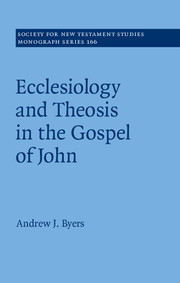Description
Ecclesiology and Theosis in the Gospel of John
Society for New Testament Studies Monograph Series
Author: Byers Andrew J.
John's Gospel directs attention to the vision of community. Andrew Byers argues that ecclesiology is as central a Johannine concern as Christology.
Language: English
Approximative price 115.27 €
In Print (Delivery period: 14 days).
Add to cart
Publication date: 06-2017
Support: Print on demand
Support: Print on demand
Description
/li>Contents
/li>Biography
/li>
For the author of the fourth Gospel, there is neither a Christless church nor a churchless Christ. Though John's Gospel has been widely understood as ambivalent toward the idea of 'church', Andrew Byers argues that ecclesiology is as central a Johannine concern as Christology. Rather than focusing on the community behind the text, John's Gospel directs attention to the vision of community prescribed within the text, which is presented as a 'narrative ecclesiology' by which the concept of 'church' gradually unfolds throughout the Gospel's sequence. The theme of oneness functions within this script and draws on the theological language of the Shema, a centerpiece of early Jewish theology and social identity. To be 'one' with this 'one God' and his 'one Shepherd' involves the believers' corporate participation within the divine family. Such participation requires an ontological transformation that warrants an ecclesial identity expressed by the bold assertion found in Jesus' citation of Psalm 82: 'you are gods'.
1. The Johannine vision of community: trends, approaches, and 'narrative ecclesiology'; Part I. The Narrative Ecclesiology of the Prologue: No Churchless Christ, nor Christless Church: 2. The inclusive divine community: the Prologue's reinterpretation of God and God's people; 3. The ecclesiology of filiation and the incarnation; 4. Characterizing the Prologue's ecclesiology: the ambiguation and assimilation of John the Baptist; 5. The Prologue's 'ecclesial narrative script': ecclesiology as story arc; Part II. The Narrative Ecclesiology of the Shema: A Reappraisal of the Johannine Oneness Motif: 6. The Shema as the foundation for John's theological use of 'one': identifying and addressing reservations; 7. The Shema, John 17, and Jewish-Christian identity: oneness in narrative development; Part III. John's Narrative Ecclesiology of Participation and Deification: 8. The Fourth Gospel and deification in patristic writings; 9. Johannine theosis: deification as ecclesiology; 10. Characterizing Johannine theosis: divinized characters within the narrative; 11. Narrative pneumatology and triadic theology: the Spirit-Paraclete as the character who divinizes beyond the narrative; 12. John's narrative ecclesiology of deification: a synthesis; Bibliography.
Andrew Byers serves as a Lecturer in New Testament and a Free Church Tutor at Cranmer Hall, University of Durham. He has an MDiv from Beeson Divinity School, Alabama, a ThM from Duke University, North Carolina, and a PhD the University of Durham. Ordained by Baptists in North Carolina, he has served for thirteen years in pastoral ministry, most recently as Chaplain of St Mary's College, University of Durham. He is the author of TheoMedia: The Media of God and the Digital Age (2013) and Faith without Illusions: Following Jesus as a Cynic-Saint (2011). He has a personal website at hopefulrealism.com.
© 2024 LAVOISIER S.A.S.
These books may interest you

Matthew Through the Centuries 102.59 €



